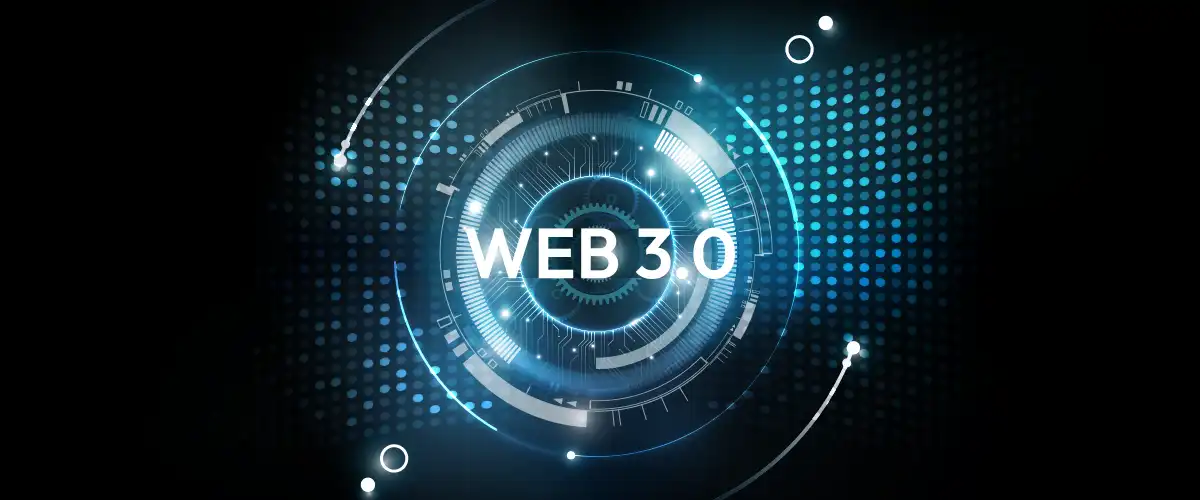What is Web3 Development and How To Do It?
Jun 12, 2024



The Internet is a dynamic space that keeps changing swiftly. A fascinating new technology called Web3 is under development that could transform how we utilize digital tools. Web3 represents the upcoming, thrilling version of the World Wide Web. Instead of having a few big companies control everything, like with today's internet, Web3 will be decentralized. This means the users will have more control over their online experience. Web3 promises to create an internet that is more focused on individual users than big corporations. This article explains what Web3 development involves. It covers the tools developers use to build Web3 applications, the best ways to create Web3 apps and some real examples of how Web3 is being used in the real world.
What is Web3?
The decentralized web, also known as Web3, is an internet vision that looks to give power from central authorities to individual users. This new model uses blockchain technology, along with decentralized networks and cryptocurrencies like Bitcoin or Ethereum, which is different from Web2, which is dominated by companies such as Google, Facebook, and Amazon. It enables people to manage their data and digital assets while controlling various online identities at the same time.
Moreover, not only does transitioning to decentralization increase security levels or privacy measures but also promotes fairness within the digital ecosystem, among other things.
Which Web3 Tools Do Blockchain Developers Use?
Many tools are available for creating decentralized apps under Web3. Two such frameworks are Truffle and Hardhat, which come with strong environments for smart contract development, testing, and deployment. Web3.js and Ethers.js can be used as libraries written in JavaScript which enable interaction with Ethereum nodes. There is this online tool called Remix IDE where one can write, test, and deploy smart contracts all at once through their web browser. MetaMask serves as a popular browser extension designed to handle digital assets management alongside dApp interaction, while WalletConnect does the same job but allows secure connections from different devices. In addition, Chainlink acts like an Oracle service provider, linking blockchains with off-chain data sources, thus enabling smart contract executions based on real-world events.
Significance of Decentralized Identity Solutions
In the exciting world of Web3, managing your online identity takes on a whole new meaning. You get to be the true boss of your personal information with advanced decentralized identity solutions like uPort and Sovrin. These innovative systems put you in full control, allowing you to choose exactly which parts of your identity to reveal without exposing your entire digital persona to the world. This smart approach not only safeguards your privacy but also greatly lowers the chances of your sensitive data getting stolen or misused, which is a major problem with traditional centralized identity management systems.
Web3 identity development involves creating self-sovereign identities that belong solely to you and can smoothly travel across different platforms and apps. This game-changing feature eliminates the hassle of having to create separate accounts or relying on third-party authentication services for every new online service you use. Your online experiences become smoother, more secure, and truly yours to command with your portable Web3 identity. No more juggling multiple login credentials or putting your trust in external parties to verify who you are – your Web3 identity is your digital passport to a borderless, user-controlled online world.
Best Practices in Web3 Development
It is essential to have a new approach when creating Web3. Security is the primary concern due to the immutable nature of blockchain. Full audits should be carried out and tests run to identify any vulnerabilities. It may be complex technically, but always keep in mind the end user. Develop interfaces for Web3 that can be understood by anyone so as to make DApps accessible to all. When designing your dApp, there might be a tendency towards centralization – don’t give in! Everything must be decentralized as much as possible. Additionally, utilize open-source codes while maintaining transparent records to promote trust with the users. Lastly, involve the community through governance tokens during decision-making processes, thus reflecting the true ethos of Web3.
Future Trends in Web3 Development
The rapid evolution of Web3, the decentralized internet, is a sure fact. There will be smooth conversing across different blockchain networks by making them interoperable. This will also help in scalability around Web3 with Layer 2 solutions such as Rollups and Sidechains coming into play. On the other hand, Decentralized Finance (DeFi) is poised to offer intricate financial instruments within blockchain systems such as loans, insurance among others. Non-Fungible Tokens(NFTs) too are going to have more use cases besides being limited only to digital arts thus far; they will be used in areas like supply chain traceability, educational certificates management as well real estate ownership proofing.
What Technologies Support Web3 to Boost Businesses?
Web3 is powered by various advanced technologies. The blockchain serves as the backbone, offering a decentralized and tamper-proof ledger system. It ensures transparency and security for all transactions without relying on intermediaries. Smart contracts play a crucial role by automating agreements and executing transactions automatically. They eliminates the need for third parties, streamlining processes. Decentralized storage networks like IPFS and Filecoin offer alternative storage solutions to centralized cloud services. These networks distribute data across multiple nodes, enhancing resilience and privacy. Cryptocurrencies facilitate fast and transparent cross-border payments. They enables secure and efficient financial transactions without the involvement of traditional banking institutions. AI and machine learning technologies enhance personalized services within Web3. They tailor experiences and recommendations for a more engaging and relevant experience by analyzing user data and preferences
Real-World Examples of Web3
Web 3 is not just a concept in many industries. DeFi transforms how we borrow and transfer by using platforms like Aave or exchanges like Uniswap. Axie Infinity allows players to make money while playing games by owning assets that are used in those particular games. You can get rewards for posting content on Steemit and other blockchain social media sites. VeChain employs blockchain technology to track products, thus enabling transparency from production all through delivery within supply chains. In addition, property deals can be executed using Propy, which utilizes smart contracts even in real estate.
Conclusion
The development of Web3 is something much bigger than just a technological change. It is a move towards the internet being fairer, more secure, and more focused on the user. Digital ownership, privacy, and value exchange are all being redefined by Web3 through blockchains, decentralized networks, and smart contracts. To become successful within this new world, Blockchain developers and businesses alike must adopt best practices, keep up with what’s happening now, and put the user in control as much as possible.
In this journey towards a decentralized future, organizations such as DecentraBlock are at the forefront. DecentraBlock, a top web3 development company, provides full services ranging from smart contract creation to decentralized identity solutions. Their knowledge of blockchain technology and adherence to industry standards sets them apart as the perfect partner for any business that wants to take advantage of Web3. When you work with DecentraBlock, remember that it is more than just making an app; with each dApp, you shape tomorrow’s internet.
The Internet is a dynamic space that keeps changing swiftly. A fascinating new technology called Web3 is under development that could transform how we utilize digital tools. Web3 represents the upcoming, thrilling version of the World Wide Web. Instead of having a few big companies control everything, like with today's internet, Web3 will be decentralized. This means the users will have more control over their online experience. Web3 promises to create an internet that is more focused on individual users than big corporations. This article explains what Web3 development involves. It covers the tools developers use to build Web3 applications, the best ways to create Web3 apps and some real examples of how Web3 is being used in the real world.
What is Web3?
The decentralized web, also known as Web3, is an internet vision that looks to give power from central authorities to individual users. This new model uses blockchain technology, along with decentralized networks and cryptocurrencies like Bitcoin or Ethereum, which is different from Web2, which is dominated by companies such as Google, Facebook, and Amazon. It enables people to manage their data and digital assets while controlling various online identities at the same time.
Moreover, not only does transitioning to decentralization increase security levels or privacy measures but also promotes fairness within the digital ecosystem, among other things.
Which Web3 Tools Do Blockchain Developers Use?
Many tools are available for creating decentralized apps under Web3. Two such frameworks are Truffle and Hardhat, which come with strong environments for smart contract development, testing, and deployment. Web3.js and Ethers.js can be used as libraries written in JavaScript which enable interaction with Ethereum nodes. There is this online tool called Remix IDE where one can write, test, and deploy smart contracts all at once through their web browser. MetaMask serves as a popular browser extension designed to handle digital assets management alongside dApp interaction, while WalletConnect does the same job but allows secure connections from different devices. In addition, Chainlink acts like an Oracle service provider, linking blockchains with off-chain data sources, thus enabling smart contract executions based on real-world events.
Significance of Decentralized Identity Solutions
In the exciting world of Web3, managing your online identity takes on a whole new meaning. You get to be the true boss of your personal information with advanced decentralized identity solutions like uPort and Sovrin. These innovative systems put you in full control, allowing you to choose exactly which parts of your identity to reveal without exposing your entire digital persona to the world. This smart approach not only safeguards your privacy but also greatly lowers the chances of your sensitive data getting stolen or misused, which is a major problem with traditional centralized identity management systems.
Web3 identity development involves creating self-sovereign identities that belong solely to you and can smoothly travel across different platforms and apps. This game-changing feature eliminates the hassle of having to create separate accounts or relying on third-party authentication services for every new online service you use. Your online experiences become smoother, more secure, and truly yours to command with your portable Web3 identity. No more juggling multiple login credentials or putting your trust in external parties to verify who you are – your Web3 identity is your digital passport to a borderless, user-controlled online world.
Best Practices in Web3 Development
It is essential to have a new approach when creating Web3. Security is the primary concern due to the immutable nature of blockchain. Full audits should be carried out and tests run to identify any vulnerabilities. It may be complex technically, but always keep in mind the end user. Develop interfaces for Web3 that can be understood by anyone so as to make DApps accessible to all. When designing your dApp, there might be a tendency towards centralization – don’t give in! Everything must be decentralized as much as possible. Additionally, utilize open-source codes while maintaining transparent records to promote trust with the users. Lastly, involve the community through governance tokens during decision-making processes, thus reflecting the true ethos of Web3.
Future Trends in Web3 Development
The rapid evolution of Web3, the decentralized internet, is a sure fact. There will be smooth conversing across different blockchain networks by making them interoperable. This will also help in scalability around Web3 with Layer 2 solutions such as Rollups and Sidechains coming into play. On the other hand, Decentralized Finance (DeFi) is poised to offer intricate financial instruments within blockchain systems such as loans, insurance among others. Non-Fungible Tokens(NFTs) too are going to have more use cases besides being limited only to digital arts thus far; they will be used in areas like supply chain traceability, educational certificates management as well real estate ownership proofing.
What Technologies Support Web3 to Boost Businesses?
Web3 is powered by various advanced technologies. The blockchain serves as the backbone, offering a decentralized and tamper-proof ledger system. It ensures transparency and security for all transactions without relying on intermediaries. Smart contracts play a crucial role by automating agreements and executing transactions automatically. They eliminates the need for third parties, streamlining processes. Decentralized storage networks like IPFS and Filecoin offer alternative storage solutions to centralized cloud services. These networks distribute data across multiple nodes, enhancing resilience and privacy. Cryptocurrencies facilitate fast and transparent cross-border payments. They enables secure and efficient financial transactions without the involvement of traditional banking institutions. AI and machine learning technologies enhance personalized services within Web3. They tailor experiences and recommendations for a more engaging and relevant experience by analyzing user data and preferences
Real-World Examples of Web3
Web 3 is not just a concept in many industries. DeFi transforms how we borrow and transfer by using platforms like Aave or exchanges like Uniswap. Axie Infinity allows players to make money while playing games by owning assets that are used in those particular games. You can get rewards for posting content on Steemit and other blockchain social media sites. VeChain employs blockchain technology to track products, thus enabling transparency from production all through delivery within supply chains. In addition, property deals can be executed using Propy, which utilizes smart contracts even in real estate.
Conclusion
The development of Web3 is something much bigger than just a technological change. It is a move towards the internet being fairer, more secure, and more focused on the user. Digital ownership, privacy, and value exchange are all being redefined by Web3 through blockchains, decentralized networks, and smart contracts. To become successful within this new world, Blockchain developers and businesses alike must adopt best practices, keep up with what’s happening now, and put the user in control as much as possible.
In this journey towards a decentralized future, organizations such as DecentraBlock are at the forefront. DecentraBlock, a top web3 development company, provides full services ranging from smart contract creation to decentralized identity solutions. Their knowledge of blockchain technology and adherence to industry standards sets them apart as the perfect partner for any business that wants to take advantage of Web3. When you work with DecentraBlock, remember that it is more than just making an app; with each dApp, you shape tomorrow’s internet.
The Internet is a dynamic space that keeps changing swiftly. A fascinating new technology called Web3 is under development that could transform how we utilize digital tools. Web3 represents the upcoming, thrilling version of the World Wide Web. Instead of having a few big companies control everything, like with today's internet, Web3 will be decentralized. This means the users will have more control over their online experience. Web3 promises to create an internet that is more focused on individual users than big corporations. This article explains what Web3 development involves. It covers the tools developers use to build Web3 applications, the best ways to create Web3 apps and some real examples of how Web3 is being used in the real world.
What is Web3?
The decentralized web, also known as Web3, is an internet vision that looks to give power from central authorities to individual users. This new model uses blockchain technology, along with decentralized networks and cryptocurrencies like Bitcoin or Ethereum, which is different from Web2, which is dominated by companies such as Google, Facebook, and Amazon. It enables people to manage their data and digital assets while controlling various online identities at the same time.
Moreover, not only does transitioning to decentralization increase security levels or privacy measures but also promotes fairness within the digital ecosystem, among other things.
Which Web3 Tools Do Blockchain Developers Use?
Many tools are available for creating decentralized apps under Web3. Two such frameworks are Truffle and Hardhat, which come with strong environments for smart contract development, testing, and deployment. Web3.js and Ethers.js can be used as libraries written in JavaScript which enable interaction with Ethereum nodes. There is this online tool called Remix IDE where one can write, test, and deploy smart contracts all at once through their web browser. MetaMask serves as a popular browser extension designed to handle digital assets management alongside dApp interaction, while WalletConnect does the same job but allows secure connections from different devices. In addition, Chainlink acts like an Oracle service provider, linking blockchains with off-chain data sources, thus enabling smart contract executions based on real-world events.
Significance of Decentralized Identity Solutions
In the exciting world of Web3, managing your online identity takes on a whole new meaning. You get to be the true boss of your personal information with advanced decentralized identity solutions like uPort and Sovrin. These innovative systems put you in full control, allowing you to choose exactly which parts of your identity to reveal without exposing your entire digital persona to the world. This smart approach not only safeguards your privacy but also greatly lowers the chances of your sensitive data getting stolen or misused, which is a major problem with traditional centralized identity management systems.
Web3 identity development involves creating self-sovereign identities that belong solely to you and can smoothly travel across different platforms and apps. This game-changing feature eliminates the hassle of having to create separate accounts or relying on third-party authentication services for every new online service you use. Your online experiences become smoother, more secure, and truly yours to command with your portable Web3 identity. No more juggling multiple login credentials or putting your trust in external parties to verify who you are – your Web3 identity is your digital passport to a borderless, user-controlled online world.
Best Practices in Web3 Development
It is essential to have a new approach when creating Web3. Security is the primary concern due to the immutable nature of blockchain. Full audits should be carried out and tests run to identify any vulnerabilities. It may be complex technically, but always keep in mind the end user. Develop interfaces for Web3 that can be understood by anyone so as to make DApps accessible to all. When designing your dApp, there might be a tendency towards centralization – don’t give in! Everything must be decentralized as much as possible. Additionally, utilize open-source codes while maintaining transparent records to promote trust with the users. Lastly, involve the community through governance tokens during decision-making processes, thus reflecting the true ethos of Web3.
Future Trends in Web3 Development
The rapid evolution of Web3, the decentralized internet, is a sure fact. There will be smooth conversing across different blockchain networks by making them interoperable. This will also help in scalability around Web3 with Layer 2 solutions such as Rollups and Sidechains coming into play. On the other hand, Decentralized Finance (DeFi) is poised to offer intricate financial instruments within blockchain systems such as loans, insurance among others. Non-Fungible Tokens(NFTs) too are going to have more use cases besides being limited only to digital arts thus far; they will be used in areas like supply chain traceability, educational certificates management as well real estate ownership proofing.
What Technologies Support Web3 to Boost Businesses?
Web3 is powered by various advanced technologies. The blockchain serves as the backbone, offering a decentralized and tamper-proof ledger system. It ensures transparency and security for all transactions without relying on intermediaries. Smart contracts play a crucial role by automating agreements and executing transactions automatically. They eliminates the need for third parties, streamlining processes. Decentralized storage networks like IPFS and Filecoin offer alternative storage solutions to centralized cloud services. These networks distribute data across multiple nodes, enhancing resilience and privacy. Cryptocurrencies facilitate fast and transparent cross-border payments. They enables secure and efficient financial transactions without the involvement of traditional banking institutions. AI and machine learning technologies enhance personalized services within Web3. They tailor experiences and recommendations for a more engaging and relevant experience by analyzing user data and preferences
Real-World Examples of Web3
Web 3 is not just a concept in many industries. DeFi transforms how we borrow and transfer by using platforms like Aave or exchanges like Uniswap. Axie Infinity allows players to make money while playing games by owning assets that are used in those particular games. You can get rewards for posting content on Steemit and other blockchain social media sites. VeChain employs blockchain technology to track products, thus enabling transparency from production all through delivery within supply chains. In addition, property deals can be executed using Propy, which utilizes smart contracts even in real estate.
Conclusion
The development of Web3 is something much bigger than just a technological change. It is a move towards the internet being fairer, more secure, and more focused on the user. Digital ownership, privacy, and value exchange are all being redefined by Web3 through blockchains, decentralized networks, and smart contracts. To become successful within this new world, Blockchain developers and businesses alike must adopt best practices, keep up with what’s happening now, and put the user in control as much as possible.
In this journey towards a decentralized future, organizations such as DecentraBlock are at the forefront. DecentraBlock, a top web3 development company, provides full services ranging from smart contract creation to decentralized identity solutions. Their knowledge of blockchain technology and adherence to industry standards sets them apart as the perfect partner for any business that wants to take advantage of Web3. When you work with DecentraBlock, remember that it is more than just making an app; with each dApp, you shape tomorrow’s internet.

DecentraBlock is at the forefront of blockchain innovation, revolutionizing how businesses secure, transact, and grow in the digital age. Join us on a journey to harness the full potential of decentralized technology for a more efficient and transparent future.
Services
Subscribe to Our Newsletter
Get the latest news, updates, and insights on blockchain technology directly to your inbox. Sign up for our newsletter today!
© 2024 DecentraBlock. All rights reserved.

DecentraBlock is at the forefront of blockchain innovation, revolutionizing how businesses secure, transact, and grow in the digital age. Join us on a journey to harness the full potential of decentralized technology for a more efficient and transparent future.
Services
Subscribe to Our Newsletter
Get the latest news, updates, and insights on blockchain technology directly to your inbox. Sign up for our newsletter today!
© 2024 DecentraBlock. All rights reserved.

DecentraBlock is at the forefront of blockchain innovation, revolutionizing how businesses secure, transact, and grow in the digital age. Join us on a journey to harness the full potential of decentralized technology for a more efficient and transparent future.
Services
Subscribe to Our Newsletter
Get the latest news, updates, and insights on blockchain technology directly to your inbox. Sign up for our newsletter today!
© 2024 DecentraBlock. All rights reserved.


